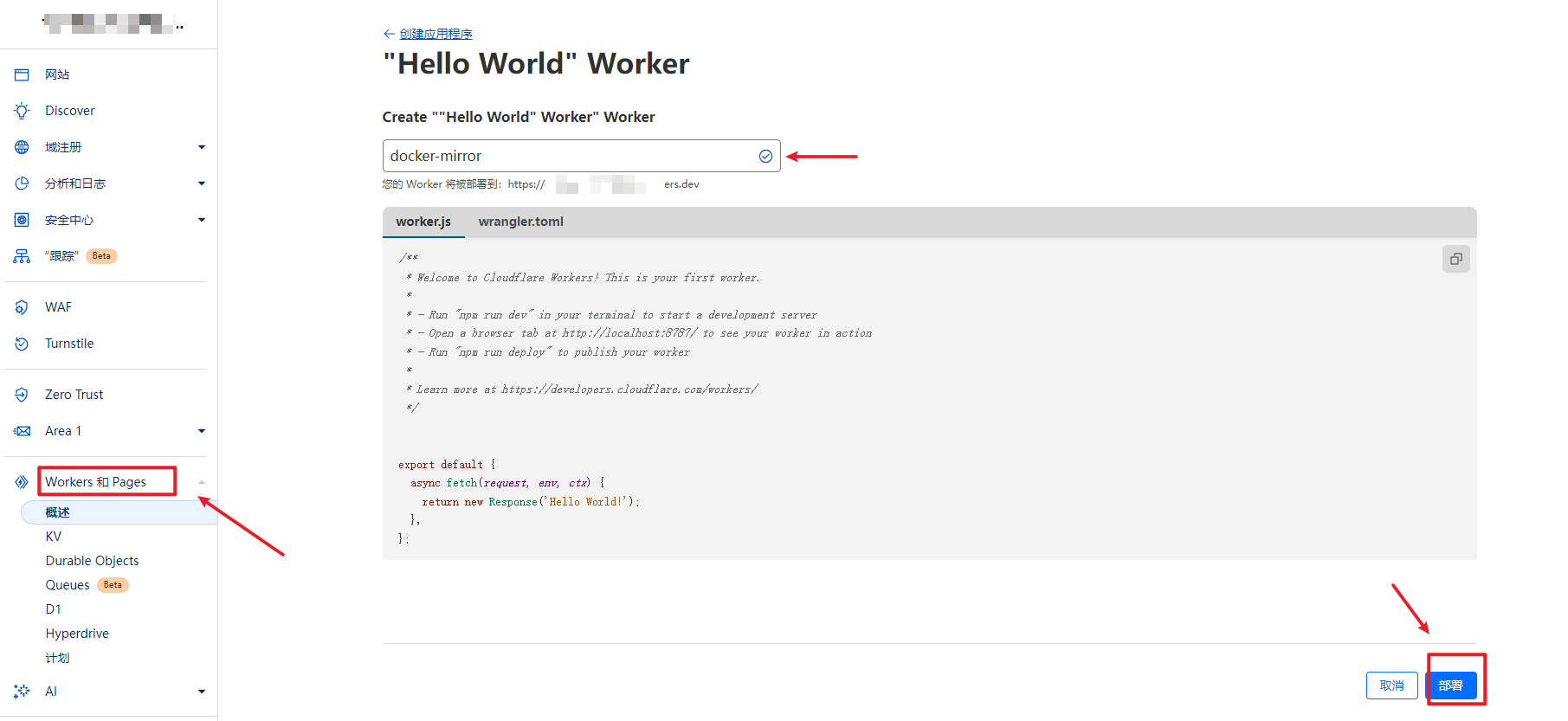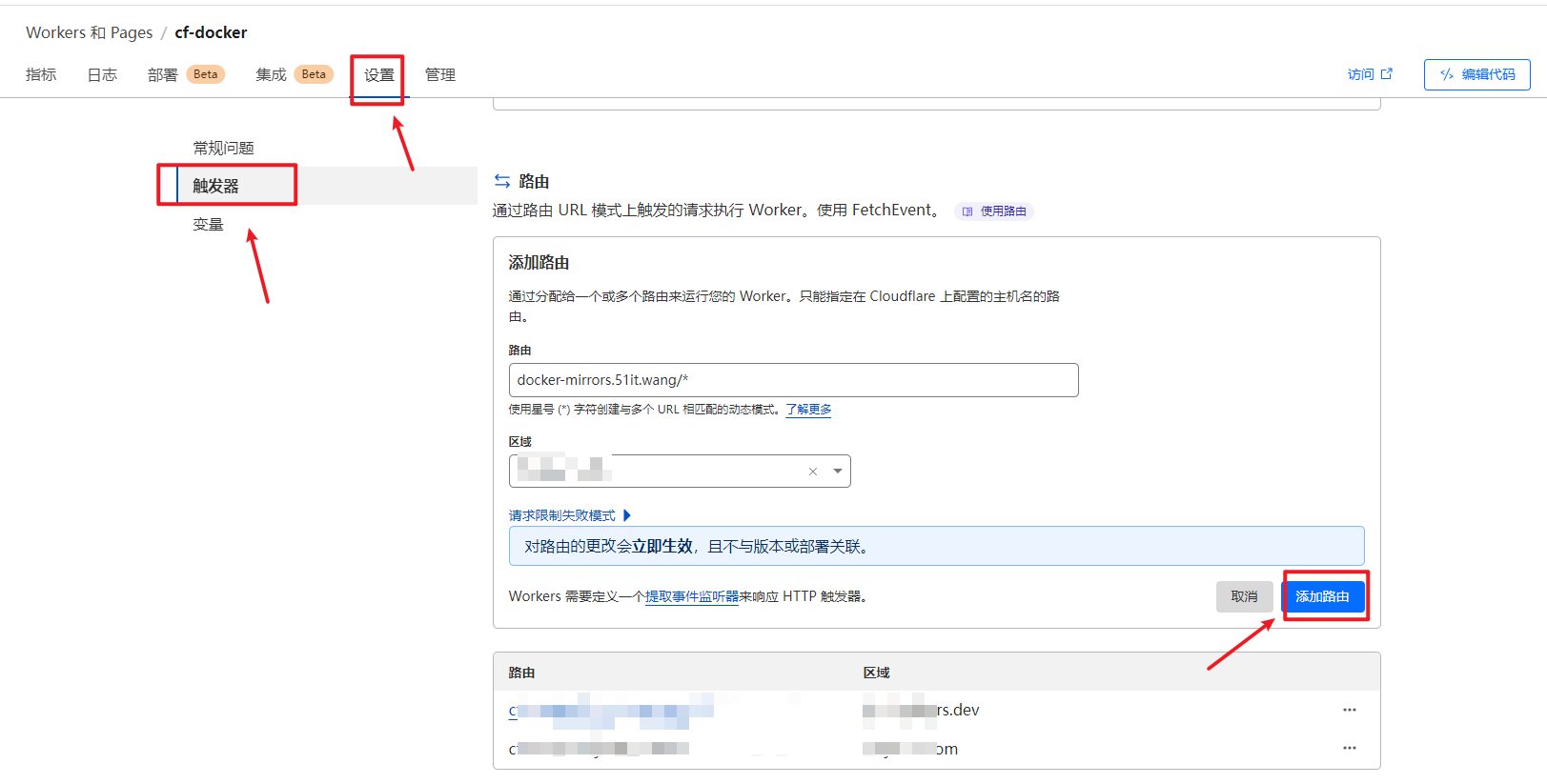利用CF Works 免费搭建 Docker 镜像加速服务
前段时间好多公开dockehrub镜像站不维护了,作为docker重度使用者拉镜像真是难了,网上好多教程都出了利用Cloudflare Workers 搭建 Docker Hub镜像加速服务,所以自己也搭建了一个,由于每天有次数限制所以不对外分享了,提供教程给大家自己搭建吧。
前提准备
一个Cloudflare账号,并且有一个域名托管到了Cloudflare上面,可以注册一些免费或者便宜的域名托管过去。注意 Worker 每天每免费账号有次数限制,为10万次。每分钟为1000次。
开始部署
登录到CF的仪表盘 https://dash.cloudflare.com/,点击Workers-and-Pages > 创建应用程序 > 创建 Worker > 点击保存 >点击完成 > 编辑代码
部署后点击编辑代码,修改 worker.js ,内容如下,第8行内容需要替换为自己的域名地址,比如
https://docker-mirrors.51it.wang,然后点击部署。代码来自开源项目基于 Cloudflare Workers 的 Docker 镜像代理工具,感谢大佬的开源。// _worker.js // Docker镜像仓库主机地址 let hub_host = 'registry-1.docker.io' // Docker认证服务器地址 const auth_url = 'https://auth.docker.io' // 自定义的工作服务器地址 修改为自己的域名,比如 https://docker-mirrors.51it.wang let workers_url = '这里需要修改自己的域名地址' // 根据主机名选择对应的上游地址 function routeByHosts(host) { // 定义路由表 const routes = { // 生产环境 "quay": "quay.io", "gcr": "gcr.io", "k8s-gcr": "k8s.gcr.io", "k8s": "registry.k8s.io", "ghcr": "ghcr.io", "cloudsmith": "docker.cloudsmith.io", // 测试环境 "test": "registry-1.docker.io", }; if (host in routes) return [ routes[host], false ]; else return [ hub_host, true ]; } /** @type {RequestInit} */ const PREFLIGHT_INIT = { // 预检请求配置 headers: new Headers({ 'access-control-allow-origin': '*', // 允许所有来源 'access-control-allow-methods': 'GET,POST,PUT,PATCH,TRACE,DELETE,HEAD,OPTIONS', // 允许的HTTP方法 'access-control-max-age': '1728000', // 预检请求的缓存时间 }), } /** * 构造响应 * @param {any} body 响应体 * @param {number} status 响应状态码 * @param {Object<string, string>} headers 响应头 */ function makeRes(body, status = 200, headers = {}) { headers['access-control-allow-origin'] = '*' // 允许所有来源 return new Response(body, { status, headers }) // 返回新构造的响应 } /** * 构造新的URL对象 * @param {string} urlStr URL字符串 */ function newUrl(urlStr) { try { return new URL(urlStr) // 尝试构造新的URL对象 } catch (err) { return null // 构造失败返回null } } function isUUID(uuid) { // 定义一个正则表达式来匹配 UUID 格式 const uuidRegex = /^[0-9a-f]{8}-[0-9a-f]{4}-[4][0-9a-f]{3}-[89ab][0-9a-f]{3}-[0-9a-f]{12}$/i; // 使用正则表达式测试 UUID 字符串 return uuidRegex.test(uuid); } async function nginx() { const text = ` <!DOCTYPE html> <html> <head> <title>Welcome to nginx!</title> <style> body { width: 35em; margin: 0 auto; font-family: Tahoma, Verdana, Arial, sans-serif; } </style> </head> <body> <h1>Welcome to nginx!</h1> <p>If you see this page, the nginx web server is successfully installed and working. Further configuration is required.</p> <p>For online documentation and support please refer to <a href="http://nginx.org/">nginx.org</a>.<br/> Commercial support is available at <a href="http://nginx.com/">nginx.com</a>.</p> <p><em>Thank you for using nginx.</em></p> </body> </html> ` return text ; } export default { async fetch(request, env, ctx) { const getReqHeader = (key) => request.headers.get(key); // 获取请求头 let url = new URL(request.url); // 解析请求URL workers_url = `https://${url.hostname}`; const pathname = url.pathname; const hostname = url.searchParams.get('hubhost') || url.hostname; const hostTop = hostname.split('.')[0];// 获取主机名的第一部分 const checkHost = routeByHosts(hostTop); hub_host = checkHost[0]; // 获取上游地址 const fakePage = checkHost[1]; console.log(`域名头部: ${hostTop}\n反代地址: ${hub_host}\n伪装首页: ${fakePage}`); const isUuid = isUUID(pathname.split('/')[1].split('/')[0]); const conditions = [ isUuid, pathname.includes('/_'), pathname.includes('/r'), pathname.includes('/v2/user'), pathname.includes('/v2/orgs'), pathname.includes('/v2/_catalog'), pathname.includes('/v2/categories'), pathname.includes('/v2/feature-flags'), pathname.includes('search'), pathname.includes('source'), pathname === '/', pathname === '/favicon.ico', pathname === '/auth/profile', ]; if (conditions.some(condition => condition) && (fakePage === true || hostTop == 'docker')) { if (env.URL302){ return Response.redirect(env.URL302, 302); } else if (env.URL){ if (env.URL.toLowerCase() == 'nginx'){ //首页改成一个nginx伪装页 return new Response(await nginx(), { headers: { 'Content-Type': 'text/html; charset=UTF-8', }, }); } else return fetch(new Request(env.URL, request)); } const newUrl = new URL("https://registry.hub.docker.com" + pathname + url.search); // 复制原始请求的标头 const headers = new Headers(request.headers); // 确保 Host 头部被替换为 hub.docker.com headers.set('Host', 'registry.hub.docker.com'); const newRequest = new Request(newUrl, { method: request.method, headers: headers, body: request.method !== 'GET' && request.method !== 'HEAD' ? await request.blob() : null, redirect: 'follow' }); return fetch(newRequest); } // 修改包含 %2F 和 %3A 的请求 if (!/%2F/.test(url.search) && /%3A/.test(url.toString())) { let modifiedUrl = url.toString().replace(/%3A(?=.*?&)/, '%3Alibrary%2F'); url = new URL(modifiedUrl); console.log(`handle_url: ${url}`) } // 处理token请求 if (url.pathname.includes('/token')) { let token_parameter = { headers: { 'Host': 'auth.docker.io', 'User-Agent': getReqHeader("User-Agent"), 'Accept': getReqHeader("Accept"), 'Accept-Language': getReqHeader("Accept-Language"), 'Accept-Encoding': getReqHeader("Accept-Encoding"), 'Connection': 'keep-alive', 'Cache-Control': 'max-age=0' } }; let token_url = auth_url + url.pathname + url.search return fetch(new Request(token_url, request), token_parameter) } // 修改 /v2/ 请求路径 if (/^\/v2\/[^/]+\/[^/]+\/[^/]+$/.test(url.pathname) && !/^\/v2\/library/.test(url.pathname)) { url.pathname = url.pathname.replace(/\/v2\//, '/v2/library/'); console.log(`modified_url: ${url.pathname}`) } // 更改请求的主机名 url.hostname = hub_host; // 构造请求参数 let parameter = { headers: { 'Host': hub_host, 'User-Agent': getReqHeader("User-Agent"), 'Accept': getReqHeader("Accept"), 'Accept-Language': getReqHeader("Accept-Language"), 'Accept-Encoding': getReqHeader("Accept-Encoding"), 'Connection': 'keep-alive', 'Cache-Control': 'max-age=0' }, cacheTtl: 3600 // 缓存时间 }; // 添加Authorization头 if (request.headers.has("Authorization")) { parameter.headers.Authorization = getReqHeader("Authorization"); } // 发起请求并处理响应 let original_response = await fetch(new Request(url, request), parameter) let original_response_clone = original_response.clone(); let original_text = original_response_clone.body; let response_headers = original_response.headers; let new_response_headers = new Headers(response_headers); let status = original_response.status; // 修改 Www-Authenticate 头 if (new_response_headers.get("Www-Authenticate")) { let auth = new_response_headers.get("Www-Authenticate"); let re = new RegExp(auth_url, 'g'); new_response_headers.set("Www-Authenticate", response_headers.get("Www-Authenticate").replace(re, workers_url)); } // 处理重定向 if (new_response_headers.get("Location")) { return httpHandler(request, new_response_headers.get("Location")) } // 返回修改后的响应 let response = new Response(original_text, { status, headers: new_response_headers }) return response; } }; /** * 处理HTTP请求 * @param {Request} req 请求对象 * @param {string} pathname 请求路径 */ function httpHandler(req, pathname) { const reqHdrRaw = req.headers // 处理预检请求 if (req.method === 'OPTIONS' && reqHdrRaw.has('access-control-request-headers') ) { return new Response(null, PREFLIGHT_INIT) } let rawLen = '' const reqHdrNew = new Headers(reqHdrRaw) const refer = reqHdrNew.get('referer') let urlStr = pathname const urlObj = newUrl(urlStr) /** @type {RequestInit} */ const reqInit = { method: req.method, headers: reqHdrNew, redirect: 'follow', body: req.body } return proxy(urlObj, reqInit, rawLen) } /** * 代理请求 * @param {URL} urlObj URL对象 * @param {RequestInit} reqInit 请求初始化对象 * @param {string} rawLen 原始长度 */ async function proxy(urlObj, reqInit, rawLen) { const res = await fetch(urlObj.href, reqInit) const resHdrOld = res.headers const resHdrNew = new Headers(resHdrOld) // 验证长度 if (rawLen) { const newLen = resHdrOld.get('content-length') || '' const badLen = (rawLen !== newLen) if (badLen) { return makeRes(res.body, 400, { '--error': `bad len: ${newLen}, except: ${rawLen}`, 'access-control-expose-headers': '--error', }) } } const status = res.status resHdrNew.set('access-control-expose-headers', '*') resHdrNew.set('access-control-allow-origin', '*') resHdrNew.set('Cache-Control', 'max-age=1500') // 删除不必要的头 resHdrNew.delete('content-security-policy') resHdrNew.delete('content-security-policy-report-only') resHdrNew.delete('clear-site-data') return new Response(res.body, { status, headers: resHdrNew }) }然后设置自定义域名works路由,点击设置 > 触发器 > 路由 > 添加路由,比如我这里就是
docker-mirrors.51it.wang/*默认访问镜像地址是返回404,如果需要伪装页面,则需要在设置-触发器-环境变量中添加URL,内容是伪装的域名,比如
https://www.baidu.com- 最后访问自定义域名跳转到百度,则说明成功。
最后docker配置使用自己的镜像即可。
sudo tee /etc/docker/daemon.json <<EOF { "registry-mirrors": ["自定义域名"] } EOF- 测试拉取镜像成功则搭建成功。
参考链接
商业转载请联系作者获得授权,非商业转载请注明本文出处及文章链接



Cloudflare+已绑定的域名 浑身都是宝